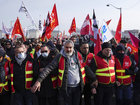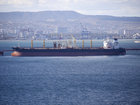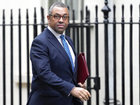Unions representing French oil workers on Thursday called for strikes against President Emmanuel Macron's pension reforms, threatening a repeat of the refinery and depot closures that caused chaos for motorists last year.
The walkouts planned for January 19 and 26 and February 6 would include "shutdowns of refinery installations if necessary," said Eric Sellini, national coordinator of the CGT union federation at energy giant TotalEnergies.
 Full Story
Full Story
The Egyptian pound was trading Wednesday at half its value from March after the central bank intervened for a third time as part of an International Monetary Fund loan agreement.
The devaluation, representing a drop of around 50 percent against the dollar over the 10-month period, comes as the price of imported food and other goods is soaring in the country of 104 million.
 Full Story
Full Story
Investments in Israel's tech sector dropped by nearly half in 2022, reflecting a global economic slowdown, a nonprofit group reported.
Startup Nation Central, which tracks the industry in Israel, said the total value of investments in the tech sector sank from an all-time high of $27 billion in 2021 to about $15.5 billion last year. The tech industry accounts for more than half the country's exports, according to official data.
 Full Story
Full Story
A price cap and European Union embargo on most Russian oil have cut into Moscow's revenue from fossil fuels, but the Kremlin is still earning substantial cash to fund its war in Ukraine because the $60-per-barrel cap was "too lenient," researchers said Wednesday.
The combination of the cap by the Group of Seven major democracies and the EU ban are costing Russia an estimated 160 million euros ($171.9 million) per day, the Helsinki-based Centre for Research on Energy and Clean Air said in a study of the first weeks of the sanctions, which took effect Dec. 5.
 Full Story
Full Story
Britain's foreign minister is meeting politicians and businesspeople in Belfast on Wednesday, bearing good news: The U.K. and the European Union are inching closer to settling a post-Brexit trade dispute that has brought economic headaches and political turmoil to Northern Ireland.
James Cleverly is traveling to Belfast two days after Britain and the EU made a significant breakthrough, striking a data-sharing agreement that will give the EU access to real-time information about goods moving to Northern Ireland from the rest of the U.K.
 Full Story
Full Story
The federal government is on track to max out on its $31.4 trillion borrowing authority as soon as this month, starting the clock on an expected standoff between President Joe Biden and the new House Republican majority that will test both parties' ability to navigate a divided Washington, with the fragile global economy at stake.
Once the government bumps up against the cap — it could happen any time in the next few weeks or longer — the Treasury Department will be unable to issue new debt without congressional action. The department plans to deploy what are known as "extraordinary measures" to keep the government operating. But once those measures run out, probably mid-summer, the government could be at risk of defaulting unless lawmakers and the president agree to lift the limit on the U.S. government's ability to borrow.
 Full Story
Full Story
Wang Jian is anxious to get back to work teaching basketball to children now that China has lifted anti-COVID-19 restrictions. But his gym in the eastern city of Shenyang has been closed for a month because all its coaches are infected.
The most optimistic forecasts say China's business and consumer activity might revive as early as the first quarter of this year. But before that happens, entrepreneurs and families face a painful squeeze from a surge in virus cases that has left employers without enough healthy workers and kept wary customers away from shopping malls, restaurants, hair salons and gyms.
 Full Story
Full Story
The CEO of energy company Uniper has decided to step down after the German government nationalized the gas supplier last month, Uniper said Tuesday.
Klaus-Dieter Maubach is exercising a special right to terminate his contract and will leave the board this year, Uniper said in a statement. It added that Maubach, who has led the company since March 2021, was willing to stay in the job until a suitable replacement is appointed.
 Full Story
Full Story
Egypt continues to battle surging inflation amid a dramatic slide of its currency as many Egyptians struggle with price hikes, the country's statistics bureau said Tuesday.
The state-run Central Agency for Mobilization and Statistics released figures showing that the annual inflation was at 21.9% last month, up from 19.2% in November. That's compared to 6.5% in December 2021, before inflation ballooned in 2022, following the outbreak of Russia's war on Ukraine that rattled the world economy.
 Full Story
Full Story
The European Union has launched two new initiatives worth 25 million Euro to support vulnerable people in Lebanon and to fight food insecurity.
"These initiatives are a response to the negative impact of Russia's war against Ukraine on the European Union's neighbouring countries," the EU Delegation to Lebanon said in a statement.
 Full Story
Full Story



